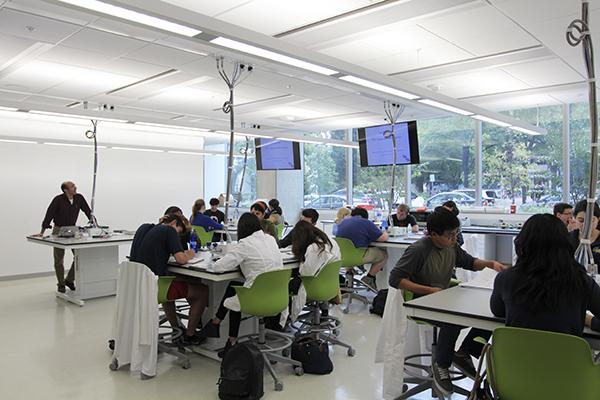A new partnership at GW’s engineering school will give students and faculty a look at how renewable energy really works.
Starting on Oct. 15, the School of Engineering and Applied Science and the European Energy Centre will host a two-day seminar course centered around the latest research findings in renewable energy. The seminars will make people aware of the technical aspect and the long-term financial and environmental impacts of energy resources, Scott Oakley, the communications officer for EEC, said.
“In our courses within universities, we always make sure that class sizes are small, which allows greater discussion,” Oakely said. “These classes also offer students the chance to network with other people on the course who may be industry professionals.”
This course primarily focuses on the technology behind solar panels, which turns light into electric currents. The curriculum was designed as a two-day training for students and faculty to receive the Galileo Master Certificate, which is a source of qualification for many employers within the sustainable energy industry. Companies similar to the EEC also offer training courses that can grant students and faculty the same certification.
Rachael Jonassen, a professorial lecturer of engineering management and systems engineering, is also a writer for EEC’s magazine Energy Learning and helped to form the connection between GW and the EEC.
She said these seminars will not only promote renewable energy but also give students a short look at what a career in energy, like design engineers and architects who incorporate green design in their work, could be like.
“What’s being taught in this particular course might provide a real opportunity for students to prepare themselves for their careers,” she said.
GW joins institutions like the University of Chicago, the University of California, Berkeley and Boston University – one of GW’s peer schools – that partner with the EEC to provide the educational seminar. The seminar is also available online. The course costs nearly $600, according to the EEC website.
The partnership is part of a push for sustainability that has been a priority for University President Steven Knapp’s administration. The University already uses solar panels to heat water in The Dakota. GW will derive half of its energy from solar power through a 20-year contract with Duke Energy Renewables that officials announced in June 2014.
University officials also outlined a plan to reduce greenhouse gas emissions by 40 percent by 2025. GW has reduced those emissions by 7 percent since 2010.
Scott Sklar, a sustainability urban planning professor, said the seminar offers a mix of different approaches to sustainable energy, like how to finance existing ways of getting renewable energy or how to save water.
“You can’t just understand it from an engineering perspective, or a law and policy perspective, or an environmental science perspective or a business perspective,” he said. “You need to intertwine those perspectives so you can understand the negative ramifications of decisions you make on energy.”
Sklar said he hopes to make the GW community aware of different ways on how to conserve energy, like using LED light bulbs, which he said can cut consumers’ regular energy use by roughly 25 percent.
Michael McGehee, an academic director of the Energy Innovation and Emerging Technologies certificate at Stanford University, said increasing awareness of renewable energy technology is crucial for the planet’s future because of threats like climate change.
“It is important for people to know about renewable energy options because they are going to be the key to meeting the world’s energy needs while reducing greenhouse gas emissions to prevent global climate change,” he said.







